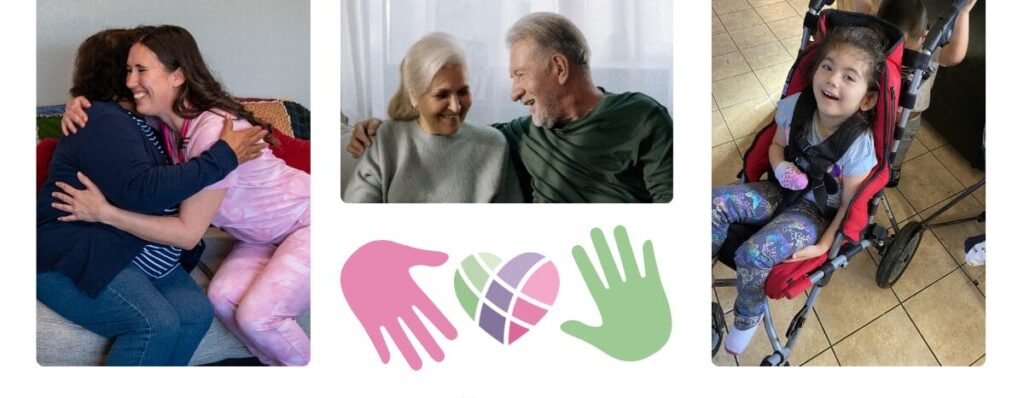Spiritual Counseling Isn’t Just for the Religious

Meet the Heartlinks Spiritual Services Team
Craig Timmons, M. Div., BCC; Eric Don Anderson, M. Div., and Teresa Darnell, M. Div., provide spiritual care to Heartlinks’ hospice and palliative care patients and their families throughout Benton and Yakima counties. They hope more people become aware of the support they provide.
What is spiritual care, you ask? We sat down with Craig, Eric and Teresa to find out.
Q: What does a hospice spiritual counselor do?
A: It is our job to assess and support patients and families as they navigate their adjustment to the concept of end-of-life. Compassionate spiritual care also includes the caregivers supporting a person at the end of their life and the hospice care workers. This includes encouragement from their faith tradition or relationships and supporting the family through a comforting presence before death or at a funeral or life celebration.
Q: Are spiritual counselors strictly Christian in faith?
A: No. We support people of all faith backgrounds as well as no faith. Spiritual counselors have extensive training in supporting people everywhere on the spectrum of how they see the world. In this region of the country, using traditional Holy Bible resources is desired and appreciated by many of our patients.
Q: If a person is not religious, why would they request spiritual care?
A: Spiritual care focuses on what is most important to the patient and family. It may include religious beliefs but does not have to. A person’s spiritual care intersects with understanding their life’s history as a human being: emotionally, mentally, physically and socially.
Q: When you visit patients, what do you talk about?
A: It depends on what the patient and family want to talk about. We often learn what has been meaningful to them over their life through conversations about deep struggles to hilarious experiences. Sometimes compassion is more about showing up and listening, or perhaps offering words of spiritual encouragement and prayer.
Q: For patients who are nonverbal, how do you provide spiritual care?
A: A spiritual counselor may bring a calming and positive presence through sitting with a patient, reading, playing music or sharing positive and encouraging sentiments. Talking with a nonverbal patient’s caregiver can help them with questions and concerns about appropriate care developments or faith traditions.
Q: How often do you visit patients?
A: We visit monthly and when another member of our team perceives a spiritual concern or need we are able to offer more immediate visits.
Q: What are the benefits of spiritual care for a hospice or palliative care patient?
A: A trained professional who is neutral to the individual’s situation can provide spiritual and emotional counsel. The ability to share one’s struggles, triumphs, questions or concerns with a trained listening ear can bring a deeper sense of peace and connection with oneself and those important to them. And maintaining a relationship with a spiritual counselor can help address the fear of dying for the patient and their loved ones.
Q: How does spiritual care impact the family of each patient you visit?
A: Just as someone who is dying is questioning and processing, so are their family members who can also benefit from a neutrally trained professional that can help them through this experience.
Q: Are patients charged for the spiritual care they receive from Heartlinks?
A: No. Spiritual care is part of the holistic care benefit at Heartlinks.
Meet Craig, Spiritual & Grief Services Supervisor

Craig Timmons, M. Div, BCC
Spiritual & Grief Services Supervisor
Craig Timmons joined the Heartlinks spiritual care team in April 2023, but previously worked in hospice care for 14 years.
He lives in Tri-Cities and has three adult children and one grandson.
Craig earned a Bachelor of Science in Mathematics from Washington State University. He also has a Master of Education from City University and a Master of Divinity from Princeton Theological Seminary. He completed his chaplain training residency program at Emmanuel Hospital in Portland focusing on pediatric care and burn recovery.
Meet Eric, Spiritual Counselor

Eric Anderson, M. Div
Spiritual Counselor
Eric Don Anderson was rehired by Heartlinks in March 2023, to serve as a spiritual counselor in Yakima County. He previously worked for Heartlinks from 2013 to 2016. Eric lives in the Terrace Heights community of Yakima with his wife, two dogs and a cat. They have one daughter and one son.
Eric studied Social Sciences at Portland State University and political science at Willamette University. He studied theology at Graduate Theological Union and became a Master of Divinity at Central American Baptists Theological Seminary.
During college, Eric served as a youth pastor in Salem, Oregon. After his ordination with the Christian Church (Disciples of Christ) in 1994 he became a senior pastor for several congregations until 2013.
Eric says his experience with death and ongoing bereavement and grief experiences as a pastor and his upbringing as a summer farm worker help him in his current role.
“Spiritually speaking, my gifts for ministry and journey toward the awakened way of being human fit very well with this community/culture and in this agricultural setting.”
Meet Theresa, Spiritual Counselor

Teresa Darnell, M. Div
Spiritual Counselor
Teresa Darnell joined the Heartlinks spiritual care team in December, 2023. She previously worked as a chaplain at various hospitals, including a children’s hospital, for 14 years and as a hospice chaplain for three years.
She lives in Richland and has four children and five grandchildren.
Teresa earned a Bachelor of Science in Food Science from Washington State University and a Master of Divinity from Faith Seminary in Tacoma. She completed her chaplain training program at Good Samaritan Hospital in Puyallup with a focus on palliative care and hospice.











